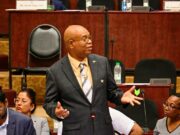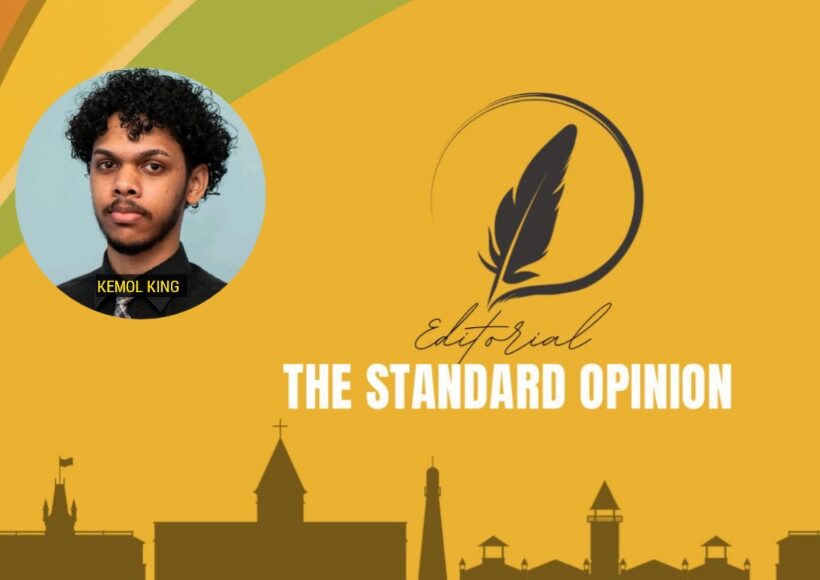By Kemol King
With General and Regional Elections set for September 1, Parliament is expected to dissolve soon. And so too will Dr. Asha Kissoon’s controversial tenure in the National Assembly. That tenure, marked by her refusal to abide by a seat-sharing agreement with other small parties, was never meant to last this long. Yet, before her exit is formalized, Kissoon has chosen to publicly declare her formal alignment with the governing People’s Progressive Party/Civic (PPP/C).
For a politician who entered Parliament under the banner of third-party independence, Kissoon’s pivot is not surprising because it started a long time ago. Her conduct in the House over the last two years has repeatedly aligned with the government. Her speeches applauded its policies and actions. The endorsement is the final bow to a power she has long cozied up to.
What makes this endorsement so extraordinary is not that it happened, but that it means so little.
Kissoon entered Parliament through a novel tripartite joinder among the Liberty and Justice Party (LJP), The New Movement (TNM), and A New and United Guyana (ANUG). They pooled their votes to earn a single seat, which they agreed would be shared across the term in proportion to each party’s contribution. LJP’s Lenox Shuman served first and stepped aside when his time was up. Kissoon, whose TNM received the fewest votes and was allotted just 80 days, refused to vacate the seat when her turn expired.
Her defense, that her appointment was legal, missed the core of the issue. This was never about legality. It was about trust. She broke that agreement and there was no public interest justification for it. Her occupation of the seat contributed no legislation, and tipped no voting scale, but it did pay her a salary and gave her a platform. So it was about self interest. And this is not what people want in an opposition candidate.
Now, as the clock runs out, she presents herself as a figure of principle, declaring that she stands with a government that keeps its promises. That’s rich coming from her. If the PPP/C is a party that keeps its promises, would being in league with Asha Kissoon make them more honourable, or less so?
Kissoon’s conduct cuts against a principle that is fundamental to personal conduct and the highest levels of governance: honoring agreements. In politics, business, diplomacy, and even simple friendship, the expectation that a person will keep their word is non-negotiable. The Guyana government itself has repeatedly made this point. Despite calls to renegotiate the controversial 2016 Production Sharing Agreement with ExxonMobil, both this administration and the last have consistently defended the sanctity of contracts, arguing that to renege would send the wrong message to investors.
The same standard applies in politics. The APNU+AFC coalition collapsed in large part because one party failed to uphold both the letter and the spirit of its agreement with the other. Kissoon’s actions follow a similar script: a breakdown of trust, a betrayal of a partnership, and the erosion of what little faith the public still has in the idea that politicians can be held to their word.
A photo accompanying the News Room report on her endorsement shows her with her father and brother alongside Vice President Bharrat Jagdeo, who is the PPP’s General Secretary, at what appears to be Freedom House, the party’s Robb Street headquarters. One is tempted to ask: Is Dr. Kissoon joining the PPP/C formally? Is she a candidate for the 2025 elections?
Outside of party circles, the reception has not been kind. The public, well aware of her defiance of the tripartite seat agreement, has responded with ridicule and skepticism. On social media, few, if any, have applauded the move. No constituency seems eager to follow her. Even TNM, the party she still refers to in the present tense as “The New Movement,” is functionally defunct. No spokesperson from her own organization, which she claims to lead, has echoed or endorsed her statement.
And then there is Ralph Ramkarran, a founding member of ANUG, who offered perhaps the most damning assessment: “Asha Kissoon committed a grossly dishonest act of political infamy and is not qualified to be in any political party. It is most shameful that the PPP/C sees fit to accept her support if it in fact did so. If it has not, the PPP should reject Asha Kissoon with contempt.”
What would the PPP/C gain in return for welcoming Kissoon with open arms? A supporter with no base? A candidate no one can trust?
In politics, endorsements matter because of what they signal. They are supposed to say: “This person, this party, reflects my values, and I speak on behalf of a community that trusts me.” Kissoon’s endorsement does none of that. She speaks for no one. Her political capital is spent. TNM does not even have a functional Facebook page. This must be what former President David Granger was talking about when he coined the term ‘cardboard parties’.
In February, this author asked what Dr. Kissoon’s endgame is. Nearly four months later, she has given the answer.
The PPP/C must ask itself whether association with Kissoon enhances its public credibility. If anything, it invites questions about the party’s standards and signals that those who violate agreements still find shelter under its roof, so long as they say the right things.













